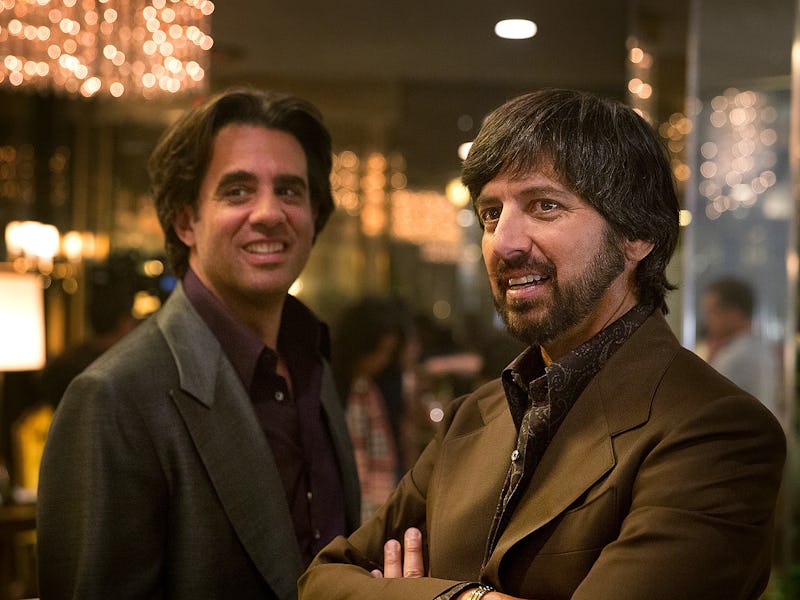Abraham Maslow's 'Hierarchy of Needs,' Explained on 'Vinyl' Episode 7
Delving into the motivational psychology text that Richie Finestra becomes obsessed with on the HBO show.

In Episode 7 of HBO’s often infuriating show Vinyl, Richie Finestra’s (Bobby Cannavale) drug abuse and long weeks away from home catch up with him, and inspire a drastic step toward self-reform. Devon (Olivia Wilde) storms out of their Connecticut house with the kids; just a couple of weeks later, he’s back on the proverbial wagon, and back in the office, keeping his head down.
Suddenly, a unexplained impulse to study psychology emerges. To be precise, Richie absorbs himself in one of the most popular science-influenced texts used in businesses: Abraham Maslow’s A Theory of Human Motivation. Maslow’s essay, published in 1943, would have become a staple among entrepreneurs, avid capitalists, and creatives alike by Richie’s era; one could imagine it being recommended to him by some rock star with lines laid out on the table in front of them.
Though Richie shirks both the mini-bar and the little white vial to focus on it, the text which he pores over quizzically in his office doesn’t offer an antidote to hedonism, specifically. In fact, it encourages readers to fulfill both primal and post-Freudian needs on their way to “self-actualization” — effectively, nirvana. Committing to spontaneity and some self-serving behavior is a critical part of coming into one’s self. Sexual freedom, for instance, is very much a part of Maslow’s theory.
But it does encourage productivity above all else, and there’s no doubt that Richie’s far-flung drug benders are doing nothing to help him get forward in life. Richie is, no doubt, more interested in Maslow’s focus on great leaders; the essay explores the hypothetical psychologies of successful men and women like Eleanor Roosevelt and Frederick Douglass. By cultivating qualities similar to these figures in himself, Richie is not just trying to better himself for the sake of reuniting his family, but to reach a level of focus and controlled disposition that will allow him to function more effectively as a businessman. With the coke and liquor clouds dissipated for the moment, Richie can truly appreciate he is in the midst of fighting what could be the final battle for his label. This close to the abyss of bankruptcy, every artist means the world, and every wad of cash helps.
“What a man can be, he must be,” Maslow states when describing what he calls “self-actualization.” Richie, in Episode 7, puts the cart before the horse while attempting to get there. Maslow-ites are supposed to pass through five levels of satiating needs and establish healthy relationships (family is certainly one of these) before becoming a deadly effective, well-adjusted “superman” figure. To Richie, Maslow’s principle means: Be a go-getter, and take what you believe is yours. On his trip to L.A. and Vegas with Zack (Ray Romano), he’s geared up poach big artists from other labels, and promise them money American Century doesn’t have to offer.
Eventually, Richie ends up in a hotel room with Elvis in Vegas, sweet-talking the now-pudgy, pill-popping King into making a return-to-form “gutbucket” rock record, and shedding the glitzy outfits and 20-piece-bands of his current seniors-friendly stage show. When the conversation goes south — Elvis is more brainwashed by his manager “Colonel” Tom Parker than Richie had understood going into the meeting — Richie gambles away the money he and Zack (Ray Romano) made from selling their private plane while attempting to make up, if only monetarily, for the botched Elvis deal. He then lies to Zack about what happened, allowing his partner to believe his two young female partners for the night had stolen it.
And so Richie has failed himself, and Maslow, by extension. In his coach seat on the plane home from Vegas, our hero frenziedly gulps down a double Smirnoff shot. If only Richie had the wherewithal to give the psychologist’s pyramid another look, he’d see he hadn’t really done any of the prescribed work. Maybe Richie could try again, but this time, really begin at the bottom of Maslow’s chart, and focusing on stuff like hydrating and eating better.
But alas, the ever-tortured White Man retreats back into a lethal mix of self-pity and self-hatred, and the Finestra cycle begins again. It remains to be seen whether American Century can survive Richie’s next dance with his own demons. As for Richie himself, his best hope is that he can somehow manage, even in his sporadically addled state, to outrun the cops who are coming for him — at least, as soon as they dig up some fresh dirt.